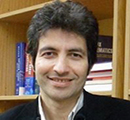Prof. Mounir Ghogho

University of Leeds, UK & UIR, Morocco
Title :Cognitive IoT for Smart Urban Sensing
Biography: Mounir Ghogho has received the M.S. degree in 1993 and the PhD degree in 1997 from the National Polytechnic Institute of Toulouse, France. He was an EPSRC Research Fellow with the University of Strathclyde (Scotland), from Sept 1997 to Nov 2001. Since Dec 2001, he has been a faculty member with the school of Electronic and Electrical Engineering at the University of Leeds (England), where he is currently a Professor. Since 2010, he has also been affiliated with the International University of Rabat, where he is currently a Scientific Advisor to the President and ICT Research Director. He was awarded the UK Royal Academy of Engineering Research Fellowship in September 2000. He is a recipient of the 2013 IBM Faculty Award. He is currently an associate editor of the Signal Processing Magazine, a steering committee member of the IEEE Transactions of Signal and Information Processing over Networks, and a member of the IEEE Signal Processing Society SAM Technical Committee. In the past, he served as an Associate Editor of IEEE Transactions on Signal Processing and the IEEE Signal Processing Letters, a member of the IEEE Signal Processing Society SPCOM and SPTM Technical Committees from 2006 to 2011, and General or TPC Chair of many international events including Eurasip’s flagship conference, EUSIPCO 2013, and IEEE SPAWC 2010. He has published over 300 journal and conference papers in the areas of signal processing, machine leaning and wireless communication. He held invited scientist/professor positions at Telecom Paris-Tech (France), NII (Japan), BUPT (China), University Carlos 3rd of Madrid (Spain), ENSICA (Toulouse), Darmstadt Technical University (Germany), and Minnesota University (USA).
Abstract: In this talk, I will briefly introduce the Internet of things (IoT) and its enabling technologies. Then, I will give a brief overview of the different wireless connectivity solutions (cellular and non-cellular) that compete to have a share of the IoT market. Fundamental limits on coverage/throughput and their relation with network density will be presented and used to explain the advantages and disadvantages of the different wireless solutions. I will then present the concept of cognitive IoT, its components and its challenges. The focus will be on cognitive sensing, communication and energy harvesting. Finally, I will briefly present my ongoing IoT projects on urban sensing.
